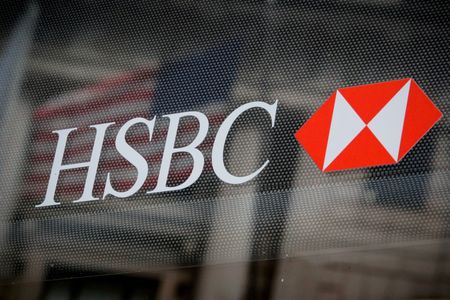 1
1 1
1

By Anshuman Daga and Lawrence White
SINGAPORE/LONDON (Reuters) -HSBC’s quarterly profit surged 92% as rising interest rates swelled net interest income, but its Hong Kong shares fell 2% as a cautious outlook left investors pondering whether the rates boost may already have peaked.
The London-headquartered bank said on Tuesday it intended to pay a special dividend of $0.21 per share, as a priority use of the proceeds from the $10 billion sale of its Canada business, as well as more regular payouts and a fresh share buyback.
Despite the dividend bonanza, the lender’s share dip suggested investors were looking beyond the payouts to the bank’s failure to raise – as some had expected – its key performance target of reaching a return on tangible equity of at least 12% from this year onwards.
HSBC’s asset disposals have picked up pace in the last year as it fends off pressure from its biggest shareholder, Ping An Insurance Group, which has urged the bank to split off its Asian business to boost returns, a move against which HSBC has pushed back.
“With the delivery of higher returns, we will have increased distribution capacity, and we will also consider a special dividend once the sale of HSBC Canada is completed,” Group Chief Executive Noel Quinn said in a statement.
Despite the improved profit performance, analysts noted HSBC’s conservative forecasts for net interest income next year, suggesting the boon from rising interest rates may already have peaked.
The outlook echoed that of British rival NatWest, which warned last week that rising interest rates may not deliver the long-lasting earnings bonanza investors hope for, sending its shares down nearly 10%.
HSBC’s London-listed shares, currently trading at their highest in about three and a half years, have rebounded 45% from October 2022 lows when a drop in quarterly profit and a sudden change in its chief financial officer spooked investors and sent its shares tumbling 7%.
Since Quinn took charge in March 2020 just as the COVID-19 pandemic swept the globe, the shares have gained 25% though still underperforming a 50% rise in the broader market. So far this year, the shares have risen 20% versus a 7% rise in the FTSE index.
For the fourth quarter, HSBC said expected credit losses nearly trebled to $1.4 billion, and included charges relating to exposure in China’s commercial real estate sector, as well as corporate exposures in Britain. This was higher than market expectations of $1.05 billion.
‘NO EASING OFF’
Quinn, who has overseen a programme of job cuts in recent years aimed at stripping out layers from the bank’s bloated management structure, said more was to come.
“There will be no easing off at all on costs … We are now considering up to $300 million of additional costs for severance in 2023,” he said.
The Asia-focused bank, which counts Hong Kong as its biggest market, also said it will return to paying quarterly dividends in 2023, and would bring forward the consideration of fresh share buybacks to the first quarter of 2023.
It reported pretax earnings of $5.2 billion for the fourth quarter, up from $2.7 billion a year earlier and ahead of the $4.96 billion average estimate of analysts compiled by the bank.
HSBC said annual expected credit losses rose to $3.6 billion, more than the $3.2 billion analysts had estimated, due to rising inflation pressuring borrowers and lingering problems in China’s property market.
Despite the fourth-quarter surge, annual profit fell to $17.5 billion from $18.9 billion for 2021, due to an impairment of $2.4 billion related to the sale of its retail banking operations in France.
That matched the $17.5 billion average estimate of 22 analysts compiled by the bank.
Meanwhile, HSBC said it still expects to complete the sale of its Russia business in first-half 2023, taking a $300 million loss.
(Reporting by Anshuman Daga and Lawrence White; Editing by Kenneth Maxwell)